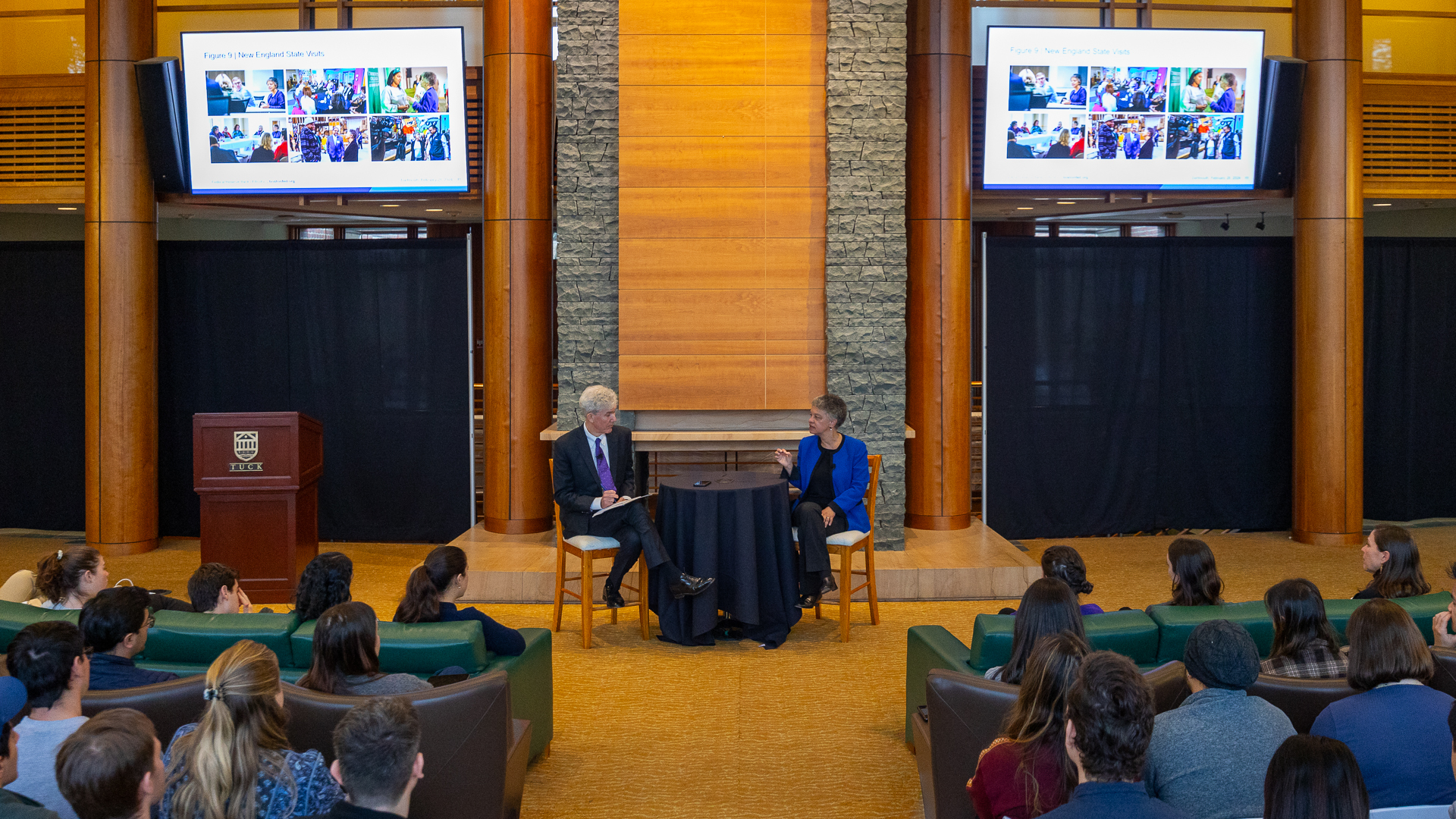Boston Fed president shares economic outlook, meets with local leaders during New Hampshire visit 
Business and community leaders name lack of housing, child care as top workforce issues 
Federal Reserve Bank of Boston President Susan M. Collins traveled from a manufacturing facility in Lebanon to Dartmouth College in Hanover and a nonprofit in Concord during a New Hampshire visit Wednesday. She shared her economic outlook and heard from business and community leaders about pressing workforce challenges.
During the visit to Dartmouth’s Center for Business, Government & Society at the Tuck School of Business, Collins offered her views on the economy’s performance and outlook. She also answered questions from students and Tuck Dean Matthew Slaughter about inflation, serving on the Federal Open Market Committee, and her career journey as an educator and Reserve Bank leader.
In one exchange, Slaughter pointed to significant economic disparities in the Upper Connecticut River Valley, which includes towns on the New Hampshire-Vermont border. He asked Collins how the Boston Fed can support inclusivity in local economies.
Collins said monetary policy has an impact, but research on economic barriers and community outreach also play a key role in supporting an economy “that works for everyone.”
“There's no way that we can have a vibrant economy – and get the kind of growth that benefits all of us – unless everyone has the opportunity to participate,” she said. “How do we find ways to provide pipelines into good jobs across a range of different (industries)? That takes working collaboratively across different sectors.”
Collins added she makes a point of talking with business, civic leaders, and residents in her travels across New England to get a well-rounded view of the region’s most pressing challenges.
For example, she said, these conversations highlighted the high toll inflation was taking and the importance of bringing it back down to 2%.
“It's about understanding the breadth of experiences we have and what an inclusive economy looks like, (and achieving) a stable environment where we can work together to really address challenges,” Collins said.
Business leaders: Lack of access to housing, child care is hurting the workforce
Earlier in the day, Collins toured Hypertherm Associates, an employee-owned company based in New Hampshire that employs 1,900 people worldwide and designs and manufactures advanced industrial cutting products. Company leaders said a lack of affordable housing and reliable child care are issues heavily impacting businesses.
8 images

“We do not have enough workforce housing here … (and) that is a massive constraint,” said Jenny Levy, Hypertherm Associates executive vice president of people, community, and environment, during a discussion with the corporate council of the nonprofit Vital Communities, which works to find equitable solutions to regional challenges.
Other business leaders shared stories of hiring new employees – from healthcare professionals to automotive technicians – only to have them back out because they can’t find a home.
A lack of affordable child care and early childhood education makes it equally difficult for families to remain in the state, Levy said. She cited research from Vital Communities that said 81% of local child care centers have a staffing shortage, with 43% of families saying they need more child care.
This means employees often can’t accept extra earning opportunities like overtime, and it can lead to one parent cutting back work hours, Levy said.
Aging population remains a key concern, but recent trends signal hope
Collins also joined local community and economic development leaders for a discussion in Hanover about opportunities and challenges facing New Hampshire residents.
The state’s aging population is a top concern, according to Zachery Palmer, an enterprise development officer from the Strafford Economic Development Corporation. He said often the only people who can afford the state’s new housing developments are well-off empty nesters. At the same time, Palmer said there aren’t enough younger people who can take over local businesses after the owners retire.
Chase Hagaman, the state director of economic development, said there’s no denying New Hampshire’s workforce gaps during a later conversation at nonprofit Granite Edvance in Concord. But he also said that for the first time in 30 years, every county in the state has seen slight population growth.
“There’s an attraction to New Hampshire that we can pounce on, … (and) there are positive trends,” he said. “The challenge is going to be meeting the demand that comes with these opportunities.”
Media Inquiries? 
Contact our media relations team. We connect journalists with Boston Fed economists, researchers, and leadership and a variety of other resources.

 About the Authors
About the Authors
Amanda Blanco is a member of the communications team at the Federal Reserve Bank of Boston.
Email: Amanda.Blanco@bos.frb.org
Site Topics
Keywords
- New Hampshire ,
- Susan M Collins ,
- Workforce ,
- employee housing ,
- child care crisis ,
- New England region






